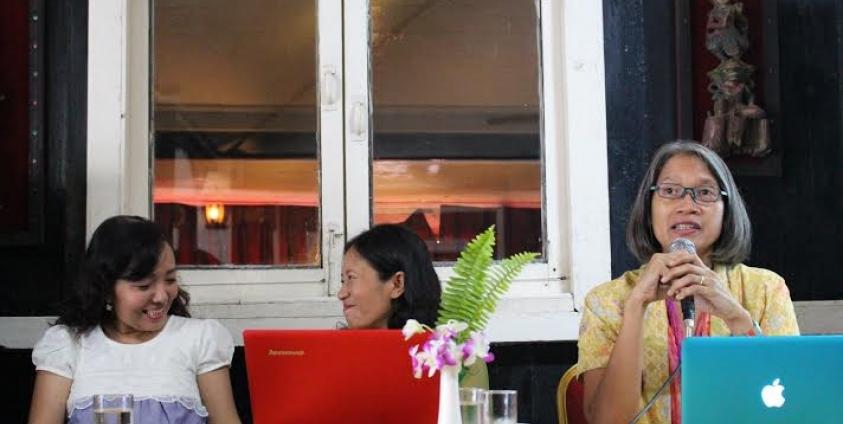Asia Justice and Rights with the support of its local partners today released a report containing the stories of 29 female survivors of violence related to conflicts in Kachin and Karen states, as well as stories of former political prisoners.
The press conference was held for the release of the 82-page report which not only highlights the need to bring about institutional changes in Myanmar’s legal and social systems, but also more importantly addresses women’s involvement in the peace process.
Opening the Box: Women’s Experiences of War, Peace and, Impunity in Myanmar took two-years and the assistance of three women’s groups to report 29 stories from women living in conflict.
This allowed those involved time to come forward and properly address their experiences of conflict and violence.
“There was a lot of checking and rechecking and then the participants were given copies of the report to ensure that everything was correct and they were comfortable with what was being used,” said Galuh Wandita, director of AJAR.
Adding that most of the participants wanted their faces in the photographs and were more than happy to talk with groups wanting to hear their stories.
A key finding in the report noted that despite the effort to curb violence against women in conflict, it is still on the rise.
Myanmar is a signatory to the Convention on the Elimination of all Violence Against Women as well as the June 2014 “Declaration Of Commitment To End Sexual Violence in Conflict.”
Three out of ten former political prisoners spoke of sexual violence, and there were reports of rape by 19 contributors from ethnic areas, most of whom were mothers and grandmothers seeking justice for the rape of their children, it notes that “the number of cases is much higher.”
“They also emphasized how many women are too ashamed or afraid to talk about their own personal experiences,” the report states.
Khin Lay from the Triangle Women Support Group spoke of how physical and sexual violence is “degrading to a woman’s character in a patriarchal society,” highlighting the reason why many women do not speak up.
Kachin rebels have refused to negotiate in recent talks with the Myanmar government and due to the fighting women are targeted and rape is used as a weapon of war.
In January this year two young women, aged 22 and 21, were raped and murdered while on missionary work in the war-ravaged state. Military court processes are secretive if they occur.
Tatmadaw soldiers enjoy a life of impunity in Kachin State with over 70 women and girls raped this year, according to the Kachin Women’s Association Thailand (KWAT).
Currently a draft bill is in motion to protect women from these different forms of discrimination, it would set the legal and social framework to protect women from various forms of violence. But, due to continuous reviews from multiple stakeholders, it is still caught up in Myanmar’s antiquated bureaucratic system.
“Only when you have the truth, only then can you have institutional change,” Mi Mi Khine - a former political prisoner - asserted to the crowd.
“Much support for women who are suffering from depression and having troubles reintegrating into communities (once being released from prison) is needed.”
Khin Mi Mi Khine currently runs a support community called Wimutti Volunteer Group, the group helps former women political prisoners integrate back into society through community support groups.
Another key finding notes that peace efforts are isolated to grassroots organisations at a community level. Women and women’s groups are excluded from peace negotiations, and that from the 29 interviewed none were involved in the process whatsoever.
“They have their rights to express opinions or present what they think, but when we stand up and say something against them it is perceived as a threat,” said Daw May Sabe Phyu on Myanmar male perceptions of opinionated women.
STORIES
Mu Dah, 22, from Karen State. Mu Dah spoke of her mother dying shortly after her birth due to living in a conflict zone and being unable to receive the necessary medical treatments she required after birth.
During her childhood she witnessed human rights violations first hand as people were publicly tortured under the command of Shan-Pu, a Burmese military officer from Shan state.
She currently works in the field to help her family of five get by and has hopes of making more money in the future.
Htu Bu, 41, from Kachin. When the mother of six gave birth to her youngest child her husband died 20 days later, leaving her to raise the family and provide support to her aged nearly blind mother in law.
After fighting broke out she was forced to move her family into hiding. She then returned to find the Burmese army in her village, she left again finding refuge in local villages. The family returned a second time only finding the Burmese Army again, this time they had no choice but to move to an IDP camp.
In the camp Htu Bu finds work cutting sugar cane for one-two days a week, she fears that her land will be lost.
She is proud of her children.
“When my child was born, my husband died. I tried to forget my husband, but I was always thinking of him. I felt like I was floating in the air. I began to understand that people look down on the family if there is no husband. Although many people find a new partner when their husband or wife dies, I made up my mind not to find another.”








